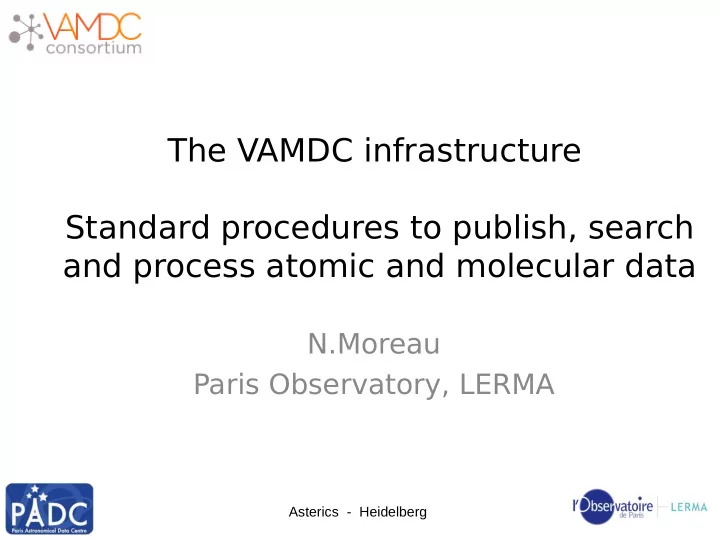

The VAMDC infrastructure Standard procedures to publish, search and process atomic and molecular data N.Moreau Paris Observatory, LERMA Asterics - Heidelberg
Gathering heterogeneous data Many services provide atomic and molecula data Content of data is different (atomic and molecular spectroscopy, collisions, solids) but we sometimes users have to compare or merge them Many services have defined their own data format Problematics : How to query multiple databases How to identify comparable data Which data format to use Goal of Virtual Atomic and Molecular Data Center project : to provide an interoperable e-Infrastructure for the exchange of atomic and molecular data. Asterics - Heidelberg
The VAMDC project Supported by EU in the framework of the FP7 (2009-2012) Involved 15 administrative partners representing 24 teams from 6 European Union member states Built an interoperable e-Infrastructure for the exchange of atomic and molecular data Now managed by the VAMDC Consortium 30 databases available Asterics - Heidelberg
The VAMDC infrastructure Organization of the infrastructure capitalized on IVOA experience : Registry Extension of VOResource data model to describe VAMDC resources Services query protocol is a simplified version of TAP (VAMDC- TAP) Asterics - Heidelberg
The VAMDC infrastructure Asterics - Heidelberg
VAMDC standards : XSAMS Asterics - Heidelberg
VAMDC standards : XSAMS XSAMS stands for XML Schema for Atomic, Molecular and Solids (http://www.vamdc.org/documents/vamdc-xsams-guide_v12.07.pdf) A common format was necessary because VAMDC includes databases providers from very different fields ( atomic, molecular and solid spectroscopy ) Standard for exchange of atomic, molecular and particle-surface-interaction (AMPSI) data Informations concerning sources and generation of the data must be provided Correctness or applicability of the data is left to the producer responsibility Asterics - Heidelberg
VAMDC standards : VAMDC-TAP Asterics - Heidelberg
VAMDC standards : VAMDC-TAP Based on IVOA TAP ( sync, async requests, all services have capabilities / availability) SQL-like requests Simplified to avoid join : The data model is seen as one big table All quantities are well defined into a dictionary http://dictionary.vamdc.eu Example : select * where ((AtomSymbol = 'he') OR (AtomSymbol = 'li')) Asterics - Heidelberg
VAMDC standards : VAMDC-TAP Asterics - Heidelberg
VAMDC standards : VAMDC-TAP Asterics - Heidelberg
VAMDC registry Asterics - Heidelberg
VAMDC registry Astrogrid registry ( UK's virtual observatory development project ) http://registry.vamdc.eu/ Contains several types of resources VAMDC nodes ( databases ) Processors ( data conversion tools ) VAMDC species database All services registered their capabilities Services endpoints Queryable and returnables quantities ( using dictionary ) Asterics - Heidelberg
VAMDC node Asterics - Heidelberg
Data node A node is a database registered in the VAMDC infrastructure It can understand VAMDC-TAP query and returns data in XSAMS We provide a middleware to implement the VAMDC layer in two versions : Java Python ( used by the majority of nodes) Source code available on github Asterics - Heidelberg
Data node If the standards are updated, the node simply updates its middleware version. Requirements : Data have to be stored in a relational database Data provider writes a mapping between the column of its database and VAMDC dictionary columns Node can respond to « select species » query that returns all the species contained in the database Before inclusion in the registry, node conformity is checked : Is returned XSAMS valid ? Is « Select species » implemented ? Asterics - Heidelberg
VAMDC portal Asterics - Heidelberg
Species database Repository of all species contained in the infrastructure, sorted by database http://species.vamdc.eu Browsable through a web site to find quickly where a species can be found, Data can be exported in a xls file, easy to sort or to convert to csv Queryable through an API : http://species.vamdc.eu/api/v12.07/nodes http://species.vamdc.eu/api/v12.07/species Returns JSON structured data Asterics - Heidelberg
VAMDC Portal http://portal.vamdc.eu Main entry point to look for data Provides two interfaces to build VAMDC-TAP requests and query all nodes Uses all elements of the infrastructure : Registry to get a list of nodes that are queried Species database to autocomplete species names XSAMS transformation tools (xml is converted to html) Asterics - Heidelberg
Further evolutions Updates in the XSAMS schema Including new data nodes ( NIST is almost done ) Providing a «simplified » database registration procedure into the infrastructure : Answer only to «select species » Get visibility in the species database Not included in the VAMDC portal Asterics - Heidelberg
Recommend
More recommend